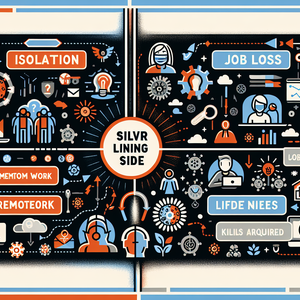The Rise of Remote Work in Ireland

The COVID-19 pandemic acted as a catalyst, accelerating the adoption of remote work in Ireland. Prior to 2020, only a small percentage of the workforce engaged in remote work regularly. A report by the Central Statistics Office revealed that before the pandemic, merely 14% of employees worked from home at least occasionally. However, as companies were forced to adapt to lockdowns, many discovered the benefits of remote operations. By 2021, approximately 46% of people in employment worked from home during the pandemic, a figure that has not only persisted but also evolved into a new norm. The shift to remote work has been facilitated by advancements in technology, enabling seamless communication and collaboration. Tools such as Zoom, Microsoft Teams, and Slack have become indispensable for remote teams, making it easier for employees to connect and work effectively from anywhere. This newfound flexibility has led to a re-evaluation of work-life balance, with many employees preferring the option to work from home.
Sought-After Remote Positions
As the remote work model takes root, specific roles have surged in demand, particularly in the tech and digital sectors. Software developers, data analysts, and digital marketing specialists are among the most sought-after positions. For instance, companies like Google and Facebook have expanded their remote work policies, allowing employees to work from anywhere, which has led to a competitive market for tech talents. According to a recent report, software development roles are projected to grow by 26% in the next decade in Ireland, highlighting the increasing reliance on tech professionals. Moreover, the rise of remote work has also impacted non-tech sectors, such as customer service and project management. Organizations are increasingly hiring remote customer service representatives, enabling them to tap into a broader talent pool without geographical constraints. This has opened up opportunities for many individuals living in rural areas of Ireland, allowing them to participate in the job market more actively. A survey conducted by the Irish Small and Medium Enterprises Association noted that 63% of businesses planned to offer remote working options post-pandemic, emphasizing the shift in employment trends.
Impact on Traditional Employment Sectors
The shift towards remote work has had a profound effect on traditional sectors, including hospitality, retail, and manufacturing. Many businesses in these industries have had to rethink their operational models. For instance, restaurants and cafes have embraced hybrid models, offering both on-premises dining and delivery services, enabling them to survive during tough economic times. This adaptation not only helps businesses stay afloat but also meets the evolving preferences of consumers who increasingly favor convenience. Furthermore, the demand for flexible working arrangements has led to an increase in hybrid roles, where employees split their time between remote work and in-office presence. This flexibility not only aids in employee retention but also attracts talent who prioritize work-life balance. A report from the Irish Business and Employers Confederation highlighted that 70% of employees would prefer to continue working remotely at least part-time, signaling a significant change in employee expectations.
Challenges and Considerations
Despite the advantages of remote work, it is not without its challenges. For many workers, the lack of face-to-face interaction can lead to feelings of isolation and reduced collaboration. Companies are now tasked with finding innovative solutions to foster team cohesion, such as virtual team-building activities and regular check-ins. A study from the Society for Human Resource Management indicated that 57% of remote workers reported feeling disconnected from their colleagues, underscoring the need for intentional engagement strategies. Additionally, the rise of remote work has raised questions about job security and the long-term implications for career progression. Employees may worry about being overlooked for promotions or professional development opportunities if they are not physically present in the office. Organizations must address these concerns by ensuring that remote employees are given equal opportunities for growth and recognition. Implementing transparent performance metrics and providing access to training programs can help mitigate these issues.
The rise of remote work in Ireland has undeniably transformed the job landscape, creating opportunities and challenges alike. As organizations adapt to this new normal, understanding the dynamics of remote employment is crucial. The surge in demand for remote positions, the evolution of traditional sectors, and the need for innovative solutions to maintain employee satisfaction highlight the complex nature of this shift. Moving forward, both employers and employees must navigate the evolving terrain of remote work to foster a resilient and inclusive job market in Ireland. Embracing flexibility and prioritizing connection will be key to thriving in this new era of work.
Remote Software Developer (Full Stack)
Shopify, HubSpot, local Irish tech startups
Core Responsibilities
Design, develop, and maintain web applications using both front-end and back-end technologies.
Collaborate with cross-functional teams to gather requirements and create user-friendly applications.
Implement testing and debugging processes to ensure optimal performance and security.
Required Skills
Proficiency in languages such as JavaScript, Python, or Ruby, along with frameworks like React or Angular.
Experience with database management (SQL, NoSQL) and version control systems (Git).
Familiarity with DevOps practices and cloud services (AWS, Azure).
Remote Data Analyst
Accenture, Bank of Ireland, various e-commerce companies
Core Responsibilities
Collect, process, and analyze large datasets to extract actionable insights and support decision-making.
Create visually appealing dashboards and reports using tools like Tableau or Power BI.
Collaborate with stakeholders to identify data needs and translate them into analytical solutions.
Required Skills
Strong knowledge of statistical analysis and experience with programming languages like R or Python.
Competency in SQL for data querying and manipulation.
Excellent problem-solving skills and the ability to communicate complex data findings effectively.
Remote Digital Marketing Specialist
HubSpot, Hootsuite, local marketing agencies
Core Responsibilities
Develop and execute digital marketing campaigns across various channels, including social media, email, and SEO.
Analyze campaign performance and optimize strategies based on data-driven insights.
Collaborate with creative teams to produce engaging content that aligns with brand objectives.
Required Skills
Proven experience with digital marketing tools (Google Analytics, SEMrush, Hootsuite).
Strong understanding of SEO best practices and social media trends.
Excellent written and verbal communication skills, with a creative flair for content creation.
Remote Customer Success Manager
Intercom, Zendesk, SaaS startups in Ireland
Core Responsibilities
Act as the main point of contact for clients, ensuring they derive maximum value from the company’s products.
Facilitate onboarding processes and provide training sessions to new customers.
Monitor customer health metrics and proactively address any issues to improve satisfaction and retention.
Required Skills
Strong interpersonal skills and the ability to build relationships in a virtual environment.
Experience with CRM software (Salesforce, Zendesk) and data analysis tools.
Problem-solving skills and a customer-focused mindset.
Remote Project Manager (Agile)
Dell Technologies, IBM, remote-first companies
Core Responsibilities
Oversee project planning, execution, and delivery while ensuring alignment with business goals.
Facilitate Agile ceremonies (sprint planning, daily stand-ups, retrospectives) and manage team dynamics.
Collaborate with stakeholders to prioritize tasks and manage project timelines effectively.
Required Skills
Experience with project management tools (JIRA, Trello) and methodologies (Scrum, Kanban).
Strong organizational and leadership skills, with the ability to adapt to changing priorities.
Excellent communication skills to liaise with remote teams and stakeholders.


